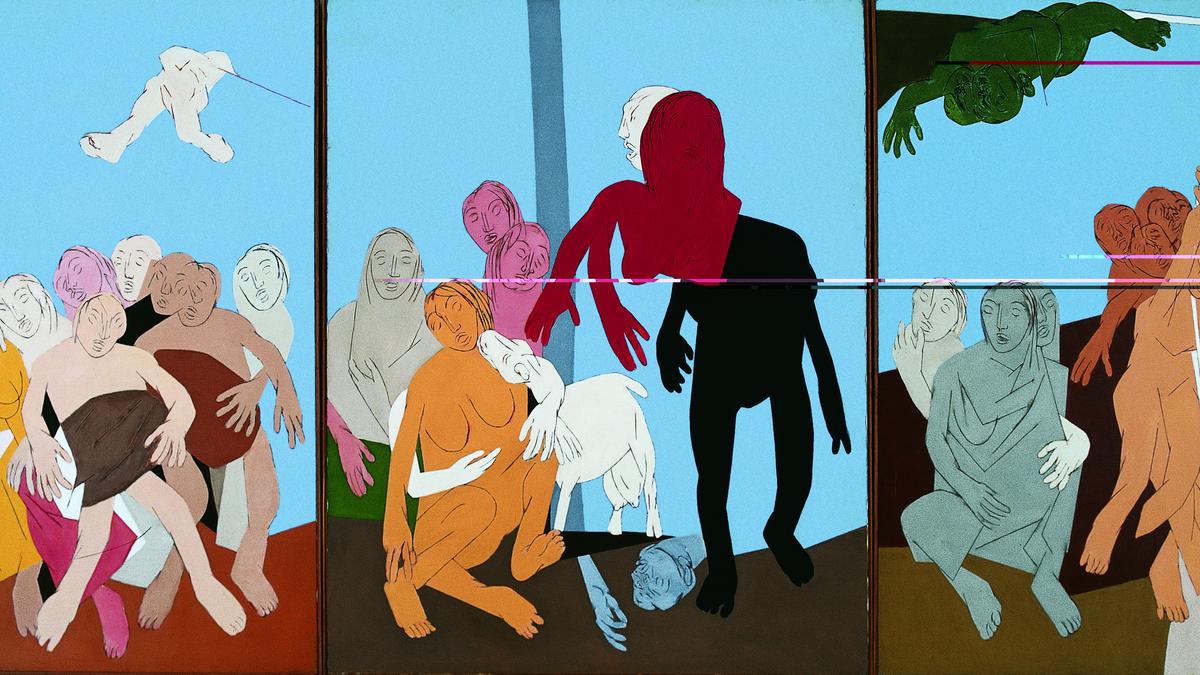Madhavi Amma from Kavumthara, Kozhikode
| Photo Credit: Special Arrangement
“You don’t visit in the evening, you dont talk to me or carry the kidsIf you don’t need me, take back to my home.But mind you, If I go home, You won’t get a drop of water….”
As 89-year-old Madhavi sings this ancient ditty, her grandson records it on his mobile phone. She smiles as she sings of a young woman complaining to her husband who has not returned home. The woman climbs up a hill and sings loudly, so that her husband may hear her and return home.
Madhavi is from Kavumthara in Kozhikode district and her local dialect-laced song is from her generation. The primarily forgotten traditional folk song will now be preserved in a digital archive.
An elderly woman narrates a story as children listen on
| Photo Credit:
Special Arrangement
LoreKeepers, a new initiative of the Archival and Research Project (ARPO), has embarked on a mission to collect and preserve folk songs and stories from across Kerala. The idea is to create an online folklore archive.
ARPO, a Kerala-based not-for-profit organisation founded in 2021, works towards discovering, preserving, promoting and sharing lesser-known aspects of the State’s cultural heritage, through digital archiving, multimedia storytelling, research, community engagement and interventions.
“For LoreKeepers, we are looking at a combination of offline and online campaigns to rope in school and college students to shoot footage of songs and stories from the elders in their families, on their mobile phones. It will be an online repository of oral traditions that would otherwise be lost to the coming generations,” says Sruthin Lal, co-founder of ARPO.
So far, the LoreKeepers has already documented over 200 folk songs/stories from the Malabar region including Kasaragod, Kannur, Kozhikode, Malappuram and Palakkad. “The idea is to develop a model involving the local communities so that we are aware of the importance of our oral traditions,” adds Sruthin.
As part of the first phase of the project, a LoreKeeper camp was organised at the TRK UP School in Vengad, Malappuram, in May. It brought in children and elders from their families, who shared unique folk stories and songs. Such camps would be held in other schools and colleges as well.
The campaign, while helping younger generations get acquainted with the oral traditions in their communities or regions, also sheds light on unique traditions followed by certain communities. For instance, members of the Paraya community of Koottalida in Kozhikode sing a particular song when a girl in the community attains menarche.
The project steers clear of oral history, Sruthin clarifies. “We are not getting into the documentation of history. This is just a database of fictional tales, art, culture and lore of the land. The oral traditions among the Dalit communities are rich and diverse. These stories and songs contain clues to our anthropological history, identity and politics, but many of these are facing the threat of being forgotten,” Sruthin adds.
Funded by the Faizal and Shabana Foundation, the project is open to all . If you come across someone in your family or neighbourhood who knows a tale, song, legend or myth which is part of local oral tradition, record it on your phone (with their consent). Note down their name, age and the pin code of the location. You can then share the video on WhatsApp/Instagram or email. 9061495795. @arpo_lorekeepers email: arpo.india@gmail.com.





